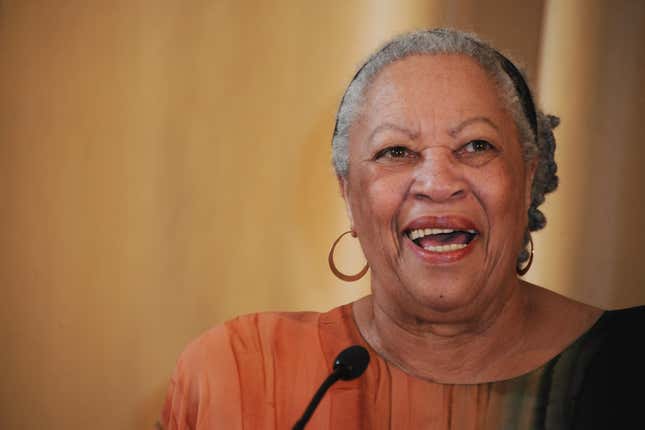
If, like me, you were heartbroken upon learning of the death of literary genius Toni Morrison on Monday, it is likely because, while Morrison’s 88 years on this earth were full and duly celebrated, her words had such a profound impact that it was often hard to believe she was a mere mortal.
Morrison was a beacon; especially for black female writers like myself who desperately needed to not only see ourselves within sweeping narratives but to know that the narratives we have to offer are valid ones. Morrison famously urged us to write the books we wanted to read, as she had, also affirming that “being a black woman writer is not a shallow place but a rich place to write from. It doesn’t limit my imagination; it expands it.” [h/t Elle]
“What I’m interested in is writing without the gaze, without the white gaze,” Morrison told the New York Times Magazine in 2015. “In so many earlier books by African-American writers, particularly the men, I felt that they were not writing to me. But what interested me was the African-American experience throughout whichever time I spoke of. It was always about African-American culture and people—good, bad, indifferent, whatever—but that was, for me, the universe.”
Though Morrison explicitly wrote of blackness, hers was a voice that resonated with the marginalized at large. As social media responded to her death yesterday, I was struck by the outpouring of emotion from all types of readers—in my circle alone, there were gay white men who saw themselves in her words, as did Asian female academics; straight, Latinx male creatives; and yes, many, many black men. In this way, the exclusivity of Morrison’s focus is made profoundly universal by its humanity; her narratives may be black ones, but as former president Barack Obama noted in his online tribute to Morrison, they are also deeply American.
Time is no match for Toni Morrison. In her writing, she sometimes toyed with it, warping and creasing it, bending it to her masterful will. In her life’s story, too, she treated time nontraditionally. A child of the Great Migration who’d lifted up new, more diverse voices in American literature as an editor, Toni didn’t publish her first novel until she was 39 years old. From there followed an ascendant career—a Pulitzer, a Nobel, and so much more—and with it, a fusion of the African American story within the American story. Toni Morrison was a national treasure. Her writing was not just beautiful but meaningful—a challenge to our conscience and a call to greater empathy. She was as good a storyteller, as captivating, in person as she was on the page. And so even as Michelle and I mourn her loss and send our warmest sympathies to her family and friends, we know that her stories—that our stories—will always be with us, and with those who come after, and on and on, for all time.
Obama’s was one of countless tributes paid to Morrison on Tuesday, many of which were by celebrities and fellow thought leaders as influenced by Morrison’s writing and unflagging commitment to truth-telling as the young black girl who first opens The Bluest Eye (often our first introduction to Morrison’s work; remarkably published when she was a single working mother of two young children).
Though Morrison’s passing leaves a chasm in our hearts, her words will continue to fill it. And for those of us still searching for the words to express the grief and gratitude we feel when considering Morrison’s legacy, perhaps it’s enough to know that our shared love for her and her work is part of that legacy. In the empathy she inspired, Toni Morrison is eternal.

